- Home
- Claudia Mills
The Nora Notebooks, Book 1: The Trouble with Ants Page 7
The Nora Notebooks, Book 1: The Trouble with Ants Read online
Page 7
Emma sat sobbing, hugging Precious Cupcake even as she kept crying, “Bad cat! Bad cat!” Emma’s mother called the vet, and they said to take Precious Cupcake to urgent veterinary care because a long swallowed ribbon could cause a blockage in a cat’s intestines. The vet said that Precious Cupcake might need surgery. Emma sobbed even harder.
“Oh, Precious Cupcake, how could you?” she moaned.
All the girls, including Nora, crowded around Emma to try to comfort her, but Emma couldn’t be comforted.
Emma’s mother loaded a loudly meowing Precious Cupcake into the cat carrier. Nora could see that it had what looked like a velvet cushion inside. Then Emma and her mother left for the vet. Emma’s sister, still in her lacy waitress apron and cap, stayed while the guests called their parents for rides home. It was only at the last minute that Nora remembered that she was still wearing Emma’s flowered hat. She set it on the front hall table, her head free at last.
“So how was it?” her mother asked in the car on the way home. “Except for poor Precious Cupcake, of course.”
“It was okay.” The scone had been tasty, even though Nora hadn’t been able to finish it with all the commotion over Cupcake’s catastrophe. “I didn’t really liketh it, but I didn’t hateth it, either.”
“Liketh? Hateth?”
“That’s what people do at fancy tea parties,” Nora told her. “They talk in a fancy way.”
“Oh,” her mother said. “Well, now we know.”
Emma’s vet decided that Precious Cupcake should be observed for twenty-four hours to see if the ribbon “emerges from the other end.” That was what Emma told the girls at lunch on Monday.
“Emerges from the other end?” Elise asked.
“You know,” Amy said, with veterinary authority. “The other end.”
“Ewww!” said Tamara.
“Gross!” said Bethy.
“Is someone going to have to check?” Elise wanted to know. “Ick!”
Emma plainly didn’t like having the words ewww, gross, and ick applied in any way to Precious Cupcake. She drew herself up erect and glared at her friends.
Nora didn’t understand how the other girls could be so grossed out by an ordinary bodily function they themselves performed every day. Mason and Brody cleaned up after Dog. Emma probably scooped out the litter box, or someone in her family did. Nora’s own ants carefully dealt with their waste, keeping it separate in a special area of the ant farm. What was ewww, gross, or ick about it?
“It’s better than making her have surgery,” Nora pointed out, trying to turn the conversation in a sensible direction. Amy nodded in agreement.
But the cries of ewww, gross, and ick had already drawn Dunk to their table, an eager glint in his eye. If there was anyone who was an expert in things that could be described in that way, it was Dunk.
“What happened?” he asked, hopeful. “What’s gross?”
“Don’t tell him,” Emma commanded.
But Bethy couldn’t resist. “Precious Cupcake swallowed a ribbon, and now Emma has to wait and see if it—well—if it—you know—comes out the other end.”
“If she poops it out?” Dunk practically shouted. He burst into the loudest guffaws Nora had heard from him yet.
Emma turned on him with a look of the fiercest rage Nora had seen from her yet.
“My cat might have to have an operation!” she spat out. “My cat might die!”
Nora thought Emma was exaggerating just a bit, for effect.
“Swallowing a ribbon can be fatal to cats! You think that’s funny? If my cat dies, you’re going to laugh?”
Poor Dunk, Nora thought. This was even worse than trying to smush his frosted cupcake onto Emma’s cat sweater.
For the first time, Dunk seemed to get it.
“I don’t want—” he stammered. “I just—I mean—poop is funny. Isn’t it?”
All of the girls now stared at him with utter disdain.
Dunk’s lower lip quivered. “I don’t want your cat to die!” he blubbered.
Emma continued to freeze him with her stare, until finally Dunk slunk away back to his own table. Bethy put her arm around Emma’s shaking shoulders.
“What if Precious Cupcake does die?” Emma whispered.
Elise’s eyes glistened.
Tamara wiped away a tear.
Nora had had all she could take. “She’s not going to die.” She looked over at Amy, who nodded.
“How do you know?” Bethy shot back.
“I don’t know,” Nora said. “But it’s very unlikely. Pets swallow things they shouldn’t all the time. Usually those things pass right through them.”
“That’s right,” Amy agreed. “And pets have operations all the time and come through them just fine.”
But the other girls were obviously in the mood to be sad. Nora couldn’t help but think it was all partly a show to make Dunk feel even worse than he did already.
She sighed and finished eating her ham and cheese sandwich. Someone had to stay calm, cool, and collected. And, as often as not, she was that someone.
At home that evening, Nora was curled up on the family room couch, busy at work on her persuasive speech, her ants beside her, busy with another ant funeral. A lot of them had been dying lately. Nora knew as well as anyone that a colony without a queen couldn’t survive forever.
But she didn’t let herself dwell on that unpleasant thought. She had to focus on her speech, which was due on Friday, just four days away.
She had decided to pull all of her ideas together and write about how more people should study science, especially girls. She had looked up statistics on what percentage of PhD degrees in science was awarded to women: not a very big one. If only more people studied science, more people would care about all the amazing creatures of the world, many of them endangered now by loss of habitat and climate change. If only more people, especially girls like Emma, studied science, they might even appreciate ants.
At seven-thirty, the phone rang. Nora picked it up.
The caller didn’t identify herself, but Nora knew right away who it was and what the call was about.
It was a girl.
And the girl said, “It came out!”
So Nora had been correct, after all.
Precious Cupcake was going to be just fine.
Nora had already calculated that the soonest she could possibly hear from Nature about her ant article would be next week. And she could hear by next week only if the big ant expert dropped everything else, pounced upon her article, and read it right away.
But as soon as she got home from school on Wednesday, her father, who was working at home, handed her a letter.
“You got something from Nature,” he said, looking puzzled. “How on earth would they have gotten your name and address? It doesn’t look like a mass mailing, either. It looks like a letter sent just to you.”
Stalling for time, Nora studied the envelope, addressed to Miss Nora Alpers.
Her father stood waiting for her to open it. Her parents would never open a piece of mail addressed to somebody else. They believed in privacy. But her father might as well have opened her letter, as he plainly planned on standing there until he found out what it said.
Well, she had been planning to tell him sooner or later. It might as well be sooner.
But today was too soon. Even the speediest ant expert couldn’t possibly have had time to review her article yet.
“Aren’t you going to open it?” her father said.
Nora picked up the fancy silver letter opener her parents kept on the front hall table and slid it under the flap of the envelope. She drew out the one sheet of paper inside. The paper was thick and fancy, with Nature printed at the top.
She started reading.
Dear Miss Alpers:
Thank you for sending us your article, “The Ants Go Marching—Until They Reach the Chalk Line!” We are impressed that you have such a serious scientific interest in ants at your age.
/> We are unable to publish this in Nature, but we hope you will send us other articles when you are older. We wish you all the best with your future career in science.
The letter was signed at the bottom with an illegible scrawl from the editor.
“So?” her father asked.
“They rejected it,” Nora said in a small voice. “I wrote an article about my ants, and I sent it to them, and they said to try again when I’m older.”
Nora didn’t tell him that she had been trying to break the Guinness World Record for youngest person to publish an article in a grown-up science journal. That goal now seemed as ridiculous as Brody’s thinking he could get Dog to hold the most tennis balls in his mouth or walk the longest distance with a glass of water on his head.
Who was she to think she could break a world record for anything?
“You sent an article to Nature?” her father asked, even though that was what she had already told him.
She handed him the letter so he could read it himself.
“I don’t think they even showed it to the big ant expert,” she whispered.
“What big ant expert?”
“You know. You said they send the articles off to big experts. But I think they just wrote me back right away. Because I’m a kid. And I didn’t even tell them I was ten. They just guessed. Even though I typed it up and everything. And made graphs! In color!”
Nora wasn’t going to cry in front of her father. She wasn’t. If she had to cry, she was going to do it later, alone with her ants.
“Honey,” her father said, “I think it’s wonderful that you tried to publish your article. How many ten-year-olds would even try?”
“An eleven-year-old girl tried and succeeded,” Nora shot back. “Her name was Emily Rosa. She’s in the Guinness World Records book.”
“An eleven-year-old published an article in Nature?” her father asked, sounding incredulous.
“No, not in Nature, but it was in some grown-up science journal.”
“Well, sweetie, some journals are easier to publish in than others. Nature is one of the very hardest. It might be too much to expect to publish in the very top journals right away. And even though you’ve been learning so much about ants, you only spent a few days on your experiment, right? Some scientists work on their experiments for years. For decades, even.”
“So I was silly to try. Is that what you’re saying?”
“No. It’s never silly to try. Everything that has ever happened in the history of science happened because of someone who tried to learn something new about this amazing, fascinating, incredibly complex world of ours.”
Nora knew her father wanted to make her feel better.
But she didn’t feel better. She didn’t feel better at all.
Upstairs in her room, she didn’t want to look at her ants. Even the sight of their busy scurrying and tunneling wasn’t going to cheer up a ten-year-old who was too young to be taken seriously by her fellow ant scientists.
How could they not think it was interesting and important that ants wouldn’t cross a chalk line unless they had an important reason to cross it? She had probably proven single-handedly that ants could not only react to the world around them by instinct but also actually think.
Maybe it was her handwriting on the envelope that had given her away. Her cursive didn’t look like her parents’ cursive. It looked like the handwriting of someone who had spent two weeks in third grade in a unit on how to write in cursive. Or maybe the title of her article wasn’t catchy, but dumb. After all, she had thought it was dumb when Coach Joe had sung “The Ants Go Marching” the day she had brought her ant farm to school, the day the other girls had screamed and run away.
She blinked back the tears she hadn’t let herself cry in front of her father.
Maybe her ants would make her feel better. Her ants didn’t know or care that she was only ten. They didn’t care that her cursive looked like writing by some kid. They didn’t care that she—that they—had just been ignored by the editor of a famous science journal.
She walked over to her ant farm to see what they were up to. But then her heart sank. Right now, actually, her ants didn’t look as if they knew or cared about much of anything.
The ant farm was strangely still.
Two ants were busy in one of the tunnels, but their activity looked aimless, as if they had lost their way, as if they weren’t sure what they were supposed to be doing anymore or why they were supposed to be doing it.
She looked more closely.
The rest of the ants were completely motionless.
Sleeping? All of them?
Or dead?
Nora had had ants die before.
Dying was one of the things ants did.
This time felt different, though.
These were the ants she had tried to show to her unappreciative classmates. These were the ants that had led to an important scientific discovery that might have even proved that ants could think.
Nora didn’t just love ants in general.
She loved these ants in particular.
But they were definitely dead, all but two of them.
Nora hadn’t known that the deaths of creatures so small could leave so big a hole in her heart.
During the morning huddle on Friday, Coach Joe asked who wanted to share their persuasive speeches. Brody’s hand was first to shoot in the air, as usual. But this time, to Nora’s great surprise, Mason raised his hand, too. Nora decided to volunteer as well. After all, what was the point of a persuasive speech if you didn’t use it to try to persuade somebody?
“Great!” Coach Joe said. “Brody, you’re up at bat first.”
“I changed mine,” Brody explained before he started reading. “I was going to write about the colonists and how they shouldn’t have a war, but just try to work things out instead. And I did write about that. But then I added something else. About a different war. A war right here in our own class.”
Brody’s eyes swept the huddle, as if to make sure that everyone was ready to be persuaded of something very important.
“Okay, Brody,” Coach Joe said. “Let’s hear it.”
Don’t Have Any Wars
By Brody Baxter
War is a very bad idea. It is always better not to have a war if possible. Whenever there is a war, one side wins and one side loses. But really both sides lose.
The American colonists were mad at the British because their taxes were too high. They were mad because they had to pay taxes on stamps. Then they got even madder because they had to pay taxes on tea. If there was one thing people loved long ago, it was drinking tea. Plus, they were mad because they didn’t get to vote on any of these taxes. They thought it wasn’t fair to have taxation without representation.
So they started a war. The war did make America free from the British. But thousands of people died on both sides. The soldiers were miserable during the cold winters. They had to walk in the snow with no shoes. The war cost a lot of money, too.
If King George the Third had just let the colonies be their own country, it would have saved lots of lives and lots of money, and the ending would have been just the same. If the colonists had tried to get along better with the British, sooner or later the British would have gotten tired of having colonies anyway. Nobody has colonies anymore today.
So they shouldn’t have had a war.
In our own class, we’ve been having a war of cat people against dog people. The war is hurting a lot of people’s feelings. There is no need to have a war in our class. Dog people can love dogs best, but they can still like cats, too. Cat people can love cats best, but they can still like dogs, too. And if they don’t, they can just keep quiet and not say mean things about other people’s pets.
If the British and Americans hadn’t had a war, they could have all been happy.
If cat lovers and dog lovers in our class stop their war, we can all be happy, too.
Brody looked up from his paper with a huge
grin.
“Thanks, Brody,” Coach Joe said. “I think a lot of us needed to hear that. So, team, is anybody persuaded?”
The huddle burst into applause.
Nora saw Dunk, blushing brick red, whisper something to Emma.
Emma giggled and whispered something back.
Dunk whispered something else.
Emma giggled again.
“Oh, Dunk!” Nora heard her say.
Apparently, Brody’s speech had brought about at least one truce in the dog-cat war.
“Mason,” Coach Joe said then. “What do you have for us? What do you want to persuade us of?”
Mason began reading:
A Persuasive Speech Against Persuasive Speeches
By Mason Dixon
In our class at school, we are learning how to write persuasive speeches. We are learning how to persuade other people to think and act the way we want them to. I think that before we learn how to persuade people, we should ask ourselves if that is a good thing to do. I say no.
The first reason we shouldn’t try to persuade people is that people have a right to think the way they want to think and to do the things they want to do. As long as it doesn’t hurt anybody else. Why should everybody think the same way? It’s good that people think lots of different things.
The second reason we shouldn’t try to persuade people is that it doesn’t work. People just decide to keep believing the first thing they believed, only harder. When someone tries too hard to sell something to you, you get suspicious. It makes you want not to buy that thing even more.
The third reason we shouldn’t try to persuade people is that it is irritating. In fact, it is very irritating. If someone doesn’t like to do new things, and other people, like that person’s parents, keep telling him to try new things, that person is going to get irritated and want the other people to stop. If that person only likes brown socks, and macaroni and cheese, and Fig Newtons, that person isn’t going to like being told over and over again to wear other-color socks and eat other foods.

 Standing Up to Mr. O.
Standing Up to Mr. O.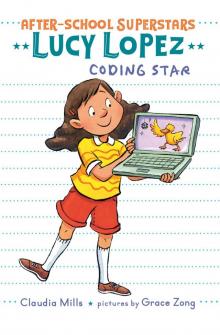 Lucy Lopez
Lucy Lopez Dinah Forever
Dinah Forever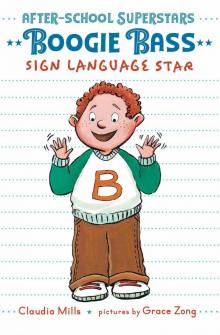 Boogie Bass, Sign Language Star
Boogie Bass, Sign Language Star Vera Vance: Comics Star
Vera Vance: Comics Star Izzy Barr, Running Star
Izzy Barr, Running Star You're a Brave Man, Julius Zimmerman
You're a Brave Man, Julius Zimmerman Nixie Ness
Nixie Ness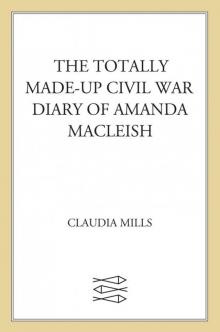 The Totally Made-up Civil War Diary of Amanda MacLeish
The Totally Made-up Civil War Diary of Amanda MacLeish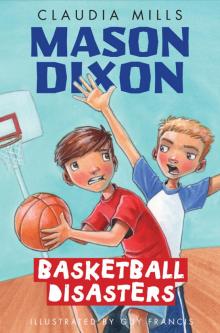 Basketball Disasters
Basketball Disasters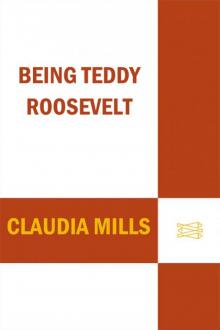 Being Teddy Roosevelt
Being Teddy Roosevelt Losers, Inc.
Losers, Inc. The Trouble with Friends
The Trouble with Friends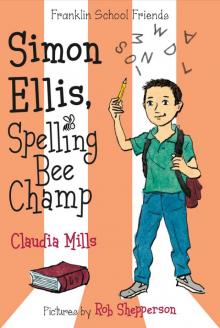 Simon Ellis, Spelling Bee Champ
Simon Ellis, Spelling Bee Champ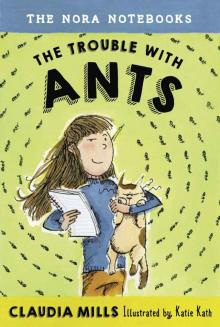 The Nora Notebooks, Book 1: The Trouble with Ants
The Nora Notebooks, Book 1: The Trouble with Ants Annika Riz, Math Whiz
Annika Riz, Math Whiz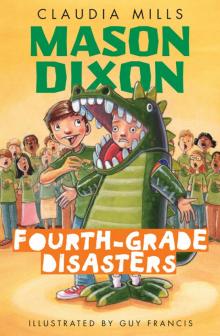 Fourth-Grade Disasters
Fourth-Grade Disasters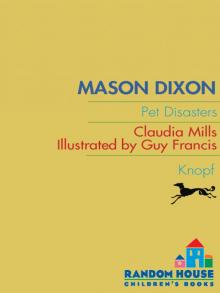 Pet Disasters
Pet Disasters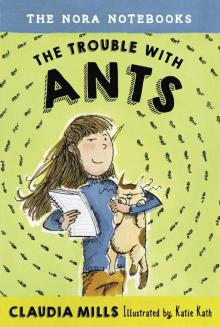 The Trouble with Ants
The Trouble with Ants Write This Down
Write This Down Alex Ryan, Stop That!
Alex Ryan, Stop That!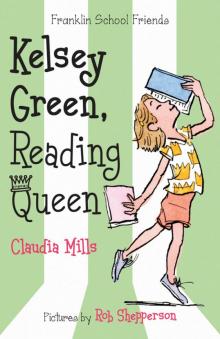 Kelsey Green, Reading Queen
Kelsey Green, Reading Queen How Oliver Olson Changed the World
How Oliver Olson Changed the World Lizzie At Last
Lizzie At Last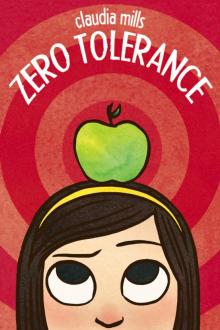 Zero Tolerance
Zero Tolerance The Nora Notebooks, Book 2
The Nora Notebooks, Book 2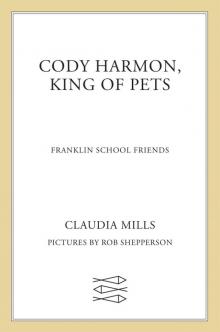 Cody Harmon, King of Pets
Cody Harmon, King of Pets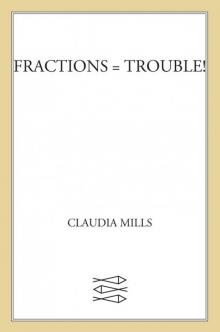 Fractions = Trouble!
Fractions = Trouble! Makeovers by Marcia
Makeovers by Marcia One Square Inch
One Square Inch